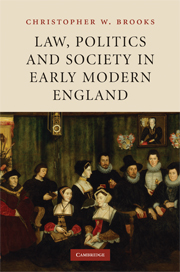Book contents
- Frontmatter
- Contents
- Preface
- Abbreviations and conventions
- 1 English history and the history of English law 1485–1642
- 2 Courts, lawyers and legal thought under the early Tudors
- 3 The initiatives of the crown and the break from Rome
- 4 Political realities and legal discourse in the later sixteenth century
- 5 The politics of jurisdiction I: the liberty of the subject and the ecclesiastical polity 1560 – c. 1610
- 6 The politics of jurisdiction II: multiple kingdoms and questions about royal authority
- 7 The absoluta potestas of a sovereign and the liberty of the subject: law and political controversy in the 1620s
- 8 The degeneration of civil society into a state of war 1629–1642
- 9 Law and ‘community’
- 10 The aristocracy, the gentry and the rule of law
- 11 Economic and tenurial relationships
- 12 The household and its members
- 13 The person, the community and the state
- 14 Conclusion
- Manuscript bibliography
- Index
- References
1 - English history and the history of English law 1485–1642
Published online by Cambridge University Press: 06 July 2010
- Frontmatter
- Contents
- Preface
- Abbreviations and conventions
- 1 English history and the history of English law 1485–1642
- 2 Courts, lawyers and legal thought under the early Tudors
- 3 The initiatives of the crown and the break from Rome
- 4 Political realities and legal discourse in the later sixteenth century
- 5 The politics of jurisdiction I: the liberty of the subject and the ecclesiastical polity 1560 – c. 1610
- 6 The politics of jurisdiction II: multiple kingdoms and questions about royal authority
- 7 The absoluta potestas of a sovereign and the liberty of the subject: law and political controversy in the 1620s
- 8 The degeneration of civil society into a state of war 1629–1642
- 9 Law and ‘community’
- 10 The aristocracy, the gentry and the rule of law
- 11 Economic and tenurial relationships
- 12 The household and its members
- 13 The person, the community and the state
- 14 Conclusion
- Manuscript bibliography
- Index
- References
Summary
This book seeks to reintegrate the history of law, legal institutions and the legal professions with the general political and social history of the period between the end of the Middle Ages and the outbreak of the English civil wars in 1642.
Conceived over two decades ago, it was originally inspired partly by the now-famous last chapter of Edward Thompson's work on the ‘Black Acts’ of the eighteenth century, Whigs and Hunters, in which he found, rather to his surprise, that the ‘culture of the rule of law’ seemed to amount to something more than the simple hegemony of the gentry over the rest of society. It might be, he acknowledged, a set of values and practices that transcended the interests of any given group, one that was sometimes appropriated and used as much by the politically dispossessed as by the elite. At roughly the same time, my own studies of civil litigation and the legal profession indicated that the numbers of lawyers were rapidly increasing in the later sixteenth century, that by the beginning of the seventeenth the central courts in England were probably more heavily used than they ever had been before, and that the social range from which the litigants were drawn was surprisingly wide. Both sets of findings seemed to point to the need for a fuller examination of the place of law in early modern society, and although it was already evident by the early 1980s that a considerable renaissance in legal history was taking place, the subject had been so neglected for so long that, while political as well as social historians frequently acknowledged the importance of ‘the law’, there was evidently a very real need for a work which attempted both a fair amount of detailed exposition as well as an interpretative overview.
- Type
- Chapter
- Information
- Law, Politics and Society in Early Modern England , pp. 1 - 10Publisher: Cambridge University PressPrint publication year: 2009

